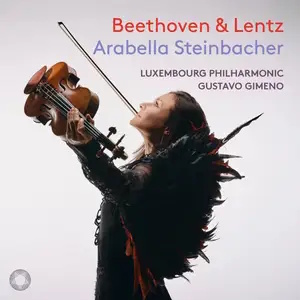
Ludwig van Beethoven (1770-1827)
Violin Concerto in D, Op. 61 (1806)
Georges Lentz (b. 1965)
“…to beam in distant heavens…” – Violin Concerto (2023)
Arabella Steinbacher (violin)
Luxembourg Philharmonic/Gustavo Gimeno
rec. 2023/24, Philharmonie Luxembourg
Pentatone PTC5187240 [80]
The USP of this disc is the violin concerto that Arabella Steinbacher commissioned from the Luxembourger Georges Lentz. Its title “… to beam in distant heavens…” is taken from Blake’s Jerusalem and speaks of Lentz’s inspiration: both Blake’s poem, and Lentz’s experience of playing his violin alone under the immense starlit skies of Australian outback, speak of the cosmic and the transcendent elements that his concerto tries to capture. On the darker side, however, he was also motivated by contemplating climate change and the recriminations that later generations will bestow onto those of us alive today; hence a section of the concerto entitled “An Elegy for our Grandchildren’s Planet”.
He writes lucidly about it in this CD’s booklet, and it’s welcome to see a contemporary composer unpacking his conception for the benefit of audiences, even if the concerto doesn’t add up to an entirely satisfying listening experience. There is, for example, intense energy to the orchestral writing, though it’s not always clear to what end. Often the textures become a little foggy or ghostly, and there’s a feeling that he captured the isolation and alienation elements of his inspiration, but not so much Blakes’ sense of the transcendent. He uses unusual instruments like an electric guitar and what sounds like toy drums, but that only really adds to the strangeness and the sense of an untidy aural traffic jam. Furthermore, Lentz throws the kitchen sink at the concerto’s ending in a way which I think he means to be ironic but ends up feeling a bit messy overall.
Steinbacher is the undisputed star of the show, however. The writing for the soloist is extraordinarily demanding, and she pulls it off with tremendous aplomb. She plays offstage for the very opening, for example, with ferocious multiple stopping and savage pizzicato which sets the tone for lots of very exposed solo writing. Playing at a distance from the orchestra while several percussive hammer blows begin the musical picture, again reinforces Lentz’s sense of alienation, and Steinbacher gets a long, 150-bar cadenza (track 7) which gets a little accompaniment at the end but is effectively carried entirely by her. It’s an astonishing achievement, and it’s clearly a work that she believes in completely.
The concerto unfolds in one continuous span, though the CD helpfully divides it into six sections, mostly identified only by their bar numbers. The “Elegy for our Grandchildren’s Planet” throbs and floats in a way that’s clearly a lament, but energized by violin’s lyrical, floating high line. This is where Lentz’s music comes closest to the mystical element and, interestingly, it’s when the orchestra is at its most fraught that the violin begins to sing most lyrically, raising us heavenwards.
So it’s an interesting listen, but it doesn’t hang together with enough coherence, and there’s a slight sense that the concerto bites off more than it can chew; as though it’s very much a first violin concert where the composer wasn’t entirely sure how to deploy his tools, how to use his resources, and what to leave out.
Everybody seems much more comfortable in the Beethoven concerto, which is hardly surprising considering its familiarity. Was it thrown in as a sweetener to make Lentz’s concerto sell? Hard to blame them if it was, but it doesn’t matter, because it gets an extremely good performance. Gustavo Gimeno shapes the orchestral sound with unobtrusive clarity and a pleasing sense of forward momentum, culminating in the big tutti that launches the first movement’s recapitulation. The string sound in the Larghetto is gorgeously warm and soft, with the winds playing counterpoint to the violin with remarkable delicacy, and the finale is paced and shaped like a peasant stomp, which gives it a tremendously winning sense of vitality. Gimeno also tweaks the tempo of the finale subtly but mischievously so as to give an extra kick of energy at key points, something I found tremendously exciting, particularly in the final run to the finish line.
On the violin, Steinbacher is an ideal partner for Gimeno. She first steals in gently but completely unapologetically, and there is lovely sweetness to her playing throughout the (marvellous) first movement. However, her violin sings with remarkably poignancy in the minor key episode just before the recapitulation, and she plays the cadenza (Kreisler’s) with gorgeous fluidity and not an ounce of self-conscious showiness. She’s really lovely in the slow movement, playing the first few variations in a playful manner, but easing out into something of hymn-like beauty when the slower counter-theme appears. She’s then the most enthusiastic dancer in the stomp of the finale, dashing off the ornamentations and flickering grace notes with breathtaking skill but always with a sense that she’s serving Beethoven’s music rather than rewriting it in her image.
It hardly needs saying that the field for recordings of the Beethoven concerto is exceptionally crowded, and there isn’t much to make this one stand out over, say Faust/Abbado, Hahn/Zinman or Ehnes/Manze, let alone the greats of the past. It’s a terrifically vital reading nonetheless, and it’s one I think I’ll be coming back to. Lentz’s concerto may take longer to win me over, but he can be grateful that he has such a first rate interpreter in Steinbacher.
Simon Thompson
Buying this recording via a link below generates revenue for MWI, which helps the site remain free




















